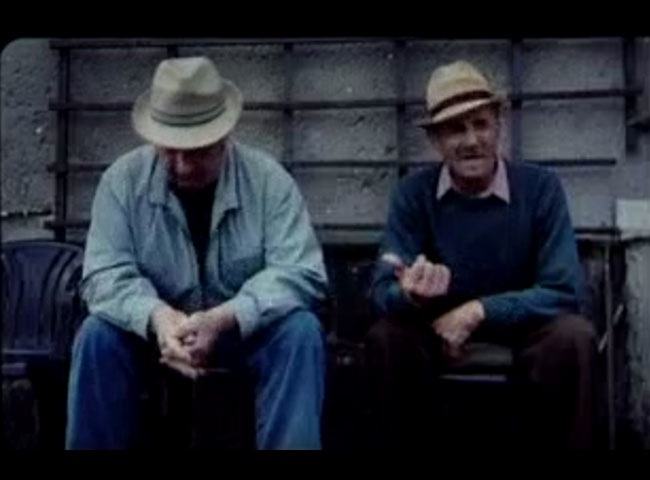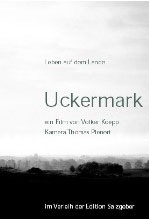Uckermark
-
Réalisé par Volker Koepp • Écrit par Volker Koepp
-
Allemagne • 2002 • 105 minutes • 35 mm • Couleur
- Réalisation :
Volker Koepp - Écriture :
Volker Koepp - Image :
Thomas Plenert - Son :
Matthias Pfister - Montage :
Angelika Arnold - Musique originale :
Rainer Böhm
- Production (structure) :
Vineta Film - Ayant droit :
Vineta Film
- N° ISAN :
ISAN 0000-0002-98B2-0000-F-0000-0000-T
Résumé
"Étonnante scène d’ouverture du dernier opus de Volker Koepp que ce dialogue savoureux dans une gare ! Il y est question de la nécessité d’améliorer les horaires de la Bundesbahn et ses connexions avec les cars qui desservent l’Uckermark. Cette région, située à soixante kilomètres au nord-est de Berlin, est la plus vaste et la moins peuplée d’Allemagne.
Un vieil homme répond vivement aux questions lapidaires de Volker Koepp hors champ. Les raisons du temps passé se mêlent aux nécessités de l’époque actuelle. Le récit est lancé, qui traite de la réorganisation d’un territoire livré au chômage, à l’exode, aux mouvements d’extrême droite.
Le film interroge les mémoires et sonde les esprits. La tradition d’une agriculture de grands domaines appartenant à l’aristocratie terrienne d’avant la seconde guerre mondiale, et la réalité du début du troisième millénaire, incertain pour l’essentiel de la population, retiennent toute l’attention du réalisateur; sans oublier quarante années d’agriculture planifiée par les coopératives de production communistes. Les destins individuels et les migrations collectives composent un tableau complexe, dans lequel les aristocrates d’antan sont en passe d’occuper à nouveau une position privilégiée en se réappropriant domaines et châteaux.
Uckermark est l’histoire de la restauration de pans de l’Ancien Régime dans de superbes paysages de collines harmonieuses, de champs généreusement étalés et de villages où se dressent de sobres églises du Moyen-Âge. Si un comte et sa famille occupent une place centrale dans ce récit, il n'en reste pas moins peuplé de paysans déchus, d'ouvriers en fin de carrière, de jeunes chômeuses et d'un chef d'entreprise. Ce sont les figures nécessaires pour approfondir la compréhension de graves problèmes économiques et de mémoires meurtries par les larmes de l'histoire. Mais le pivot de Uckermark, c'est Fritz Marquardt, paysan avant d'être homme de théâtre à la solide réputation. Il évoque, raisonne, commente, à la manière d'un sage. Son intelligence aiguë fait le lit d'un désenchantement lucide, sa présence chaleureuse confère de l'épaisseur aux destins collectifs que Volker Koepp et le directeur de la photographie, Thomas Plenert, captent avec une sensibilité tout à la fois politique et poétique.
(JP - Visions du Réel)
"What a surprising opening scene is the colourful exchange in a station in Volker Koepp’s last opus! The issue is the need to improve the timetable of the Bundesbahn and its connections with the buses serving the Uckermark area. This region, situated sixty kilometres to the northeast of Berlin is the largest and least populated in Germany.
An old man briskly answers the questions Volker Koepp throws at him from off-screen. The imperatives of the past combine with today’s needs. There is the story dealing with the reorganisation of a region prey to unemployment, depopulation, and extreme right wing movements.
The film calls on memories and explores people’s minds. The tradition of large farming estates belonging to a landed gentry before the Second World War and the reality of the beginning of the third millennium, uncertain for most of the population, command our complete attention; without forgetting forty years of planned farm production with the Communist cooperatives. Individual destinies and collective migrations compose a complex picture in which the aristocracy of the past is about once again to occupy a privileged position by re-appropriating estates and chateaux.
Uckermark is the story of the restoration of sections of the old regime in superb landscapes of rolling hills, of fields generously spread out and villages with their sober medieval churches. Although a Count and his family play a central role in this story, it is also peopled with peasants deprived of their land, labourers coming to the end of their working lives, young unemployed women, and an entrepreneur. These characters are needed to gain a deeper understanding of today’s serious economic problems and the scars of past events left in people’s memories.
But the central figure in "Uckermark", is Fritz Marquardt, a former peasant, now an acknowledged dramatist. He evokes, reasons and comments in the manner of a wise man. His sharp intelligence is the foundation for lucid disenchantment and his warm presence confers substance to the collective fates which Volker Koepp and the director of photography, Thomas Plenert, capture with a sensibility both political and poetic."
(Jean Perret)
Mot(s)-clé(s) thématique(s)
Comment avoir accès au film ?
- Sortie en salle
-
Édition DVD
- Il n'existe pas d'édition DVD à notre connaissance
-
Accès VOD
- Il n'existe pas d'accès en VOD à notre connaissance
- Distribution
- Aide sur les moyens d'accéder à un film

